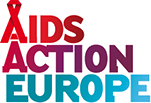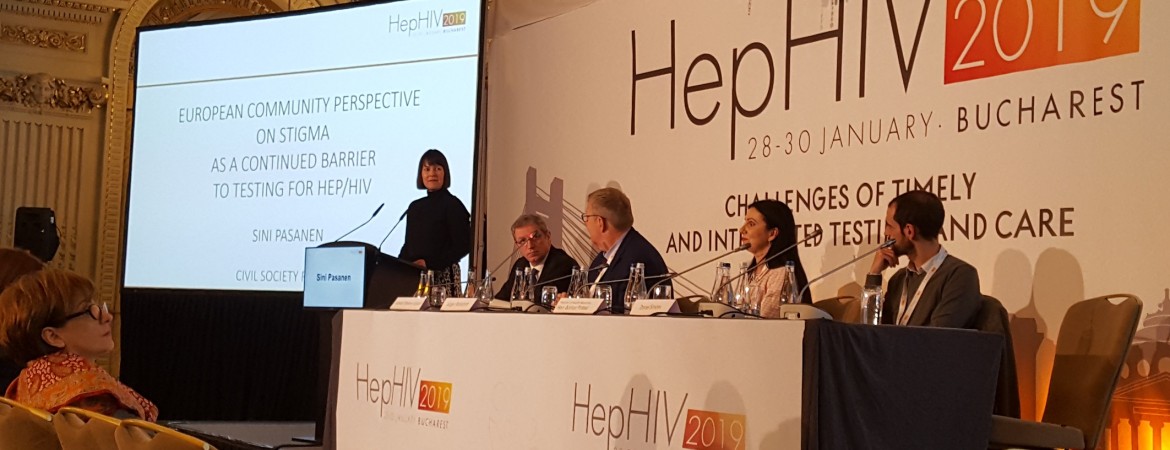The opening of the 2019 HepHIV Conference marks the shift toward integrated testing strategies and initiatives to allow for effective synergies across different infectious diseases and the renaming announcement of HIV in Europe to EuroTEST
More than 200 people gathered in Bucharest, Romania for the opening of the sixth HepHIV2019 Conference to highlight the European response to HIV, viral hepatitis and other infectious diseases including sexually transmitted infections (STIs) and tuberculosis (TB). The conference focuses on earlier testing emphasised by the 2019 theme, “Challenges of Timely and Integrated Testing and Care.” Since its inception, the conference is organised by the HIV in Europe initiative and affiliated partners, while the 2019 conference has been organised jointly with the 3-year EU funded Joint Action INTEGRATE.
The HepHIV 2019 Conference in Bucharest is under the Patronage of the Romanian Presidency of the Council of the EU.
“Romania is a representation of the progress made within Central and Eastern Europe but also brings attention to the work that is still needed to address these four infectious diseases,” says Professor Adrian Streinu-Cercel, HepHIV2019 Conference Co-chair, Head of Infectious Diseases Department of the Carol Davila University of Medicine and Pharmacy & Manager of National Institute of Infectious Diseases "Prof. Dr. Matei Bals" Bucharest.
Although the rate of reported cases of hepatitis B, hepatitis C, and STIs have been on a downward trend in recent years, in 2016, Romania had one of the highest reported rates of TB cases in the EU/EEA. Additionally, the proportion of those diagnosed late with HIV was over 50% in 2017 and legislation continues to act as a barrier in accessing testing in the country, specifically with policies that criminalise sex work and lack of legislation for trained lay providers to provide HIV testing.
“The Eastern Europe and Central Asia region continue to experience political, legal and technical challenges in their responses to HIV, viral hepatitis, STIs and TB especially for key populations at-risk. Hosting the conference in Bucharest can help bring these issues in the region to the forefront and help influence needed change” says Dr. Jürgen Rockstroh, HepHIV2019 Conference Co-chair, Professor of Medicine and Head of the University of Bonn HIV Outpatient Clinic & EuroTEST Steering Committee Co-Chair.
The 2019 HepHIV Conference scientific programme showcases research and interventions throughout Europe that are effectively addressing multiple infectious diseases and are getting more people tested and into treatment. Additionally, almost 20 sessions and abstracts in the scientific programme focus on research from the Eastern Europe and Central Asia region.
To mark the opening day of HepHIV2019, the HIV in Europe initiative is officially renaming to EuroTEST. The aim of the renaming to EuroTEST is to broaden the disease scope of the initiative to address hepatitis, HIV, STIs and TB. EuroTEST aims to utilise integrated strategies to help increase early detection and earlier entry into treatment leading to better health outcomes and preventing the risk of further transmission.
The HIV in Europe initiative began in 2007 as way to bring attention to the importance of earlier diagnosis and care for people living with HIV. Although the initiative started with a HIV focus, the growing evidence has shown that HIV, hepatitis B and hepatitis C share overlaps in the modes of transmission and affect common key populations therefore, the initiative made a concerted effort in 2013 to also prioritise hepatitis. Since its initiation, HIV in Europe has built an European platform where representatives from civil society, policy institutions, health care and European public health institutions work toward influencing policy, knowledge sharing and building the evidence-base to support earlier diagnosis and care of HIV and viral hepatitis across Europe. EuroTEST will continue to do so as with the additional focus on STIs and TB.
Movement toward wider disease integration
Viral hepatitis, HIV, STIs and TB remain public health concerns in Europe. The rates of HBV and HCV remain high in Europe with many unware of their infection. HIV affects more than 2 million people in the WHO Europe region, particularly in the eastern part of the region while STIs disproportionately affect vulnerable groups in Europe including young adults and men who have sex with men. The latest data on TB has shown decreasing incidence rates however, current rates are not enough to achieve the WHO target of reducing TB incidence as part of the End TB strategy. These infectious diseases are also frequently interlinked due to overlaps in modes of transmission and affected key populations. These conditions also face similar challenges including stigma, large proportions of undiagnosed populations and late presenters. Testing and early diagnosis is key to addressing these infectious diseases, however, many people remain unaware of their status and too many are diagnosed late. Late diagnosis of these diseases poses the potential risk of onward transmission, poorer health outcomes due to delays in treatment and increased health care costs.
The re-naming to EuroTEST reflects the growing interest to prioritise testing for infectious diseases that disproportionately affect key population groups who often experience stigma and discrimination. EuroTEST supports initiatives that utilise an integrated approach for testing interventions with the aim of increasing testing coverage for key groups and reducing late diagnosis.
“The data being presented at HepHIV2019 proves that programmes and initiatives have already been effectively implementing integrated testing strategies. The name change to EuroTEST and inclusion of STIs and TB will help support existing efforts by recognising their achievements and build the rationale for more support for integrated testing strategies from policy makers and stakeholders,” says Daniel Simões, HepHIV2019 Conference Co-chair, Board member of Grupo de Ativistas em Tratamentos & EuroTEST Steering Committee co-chair.
The broadening of the disease scope within EuroTEST is also reflected by current initiatives within Europe that encourage integrated testing and prevention efforts including the EU policy framework on HIV/AIDS, TB and hepatitis, the EU funded INTEGRATE Joint Action, European Testing Week, several European Centre for Disease Prevention and Control publications and guidelines including the recent public health guidance on integrated testing for HBV, HCV and HIV and the joint ECDC and EMCDDA guidance on preventing blood-borne viruses in prison settings.
The HepHIV2019 conference and EuroTEST recognise the significance of integrated testing strategies and call upon the European community of policy makers, NGOs, healthcare professionals and public health institutions to support synergies between the overlapping diseases and remove barriers in legislation. Referring to the HepHIV2019 theme - Challenges of Timely and Integrated Testing and Care - Cristiana Oprea, Victor Babes Clinical Hospital for Infectious and Tropical Diseases, European AIDS Clinical Society Governing Board and HepHIV2019 Organising Committee member adds, “We cannot let these challenges deter us, we should use the discussions at HepHIV2019 to help guide us forward in the effort to get people tested and into earlier care. We should implement a multidisciplinary approach, including national policies for routine testing for these diseases when appropriate, improve harm-reduction programs and the continuum of care, in particular for key populations, and equal access to testing and treatment should be guaranteed in all European regions.”
Follow the conference via #HepHIV2019

